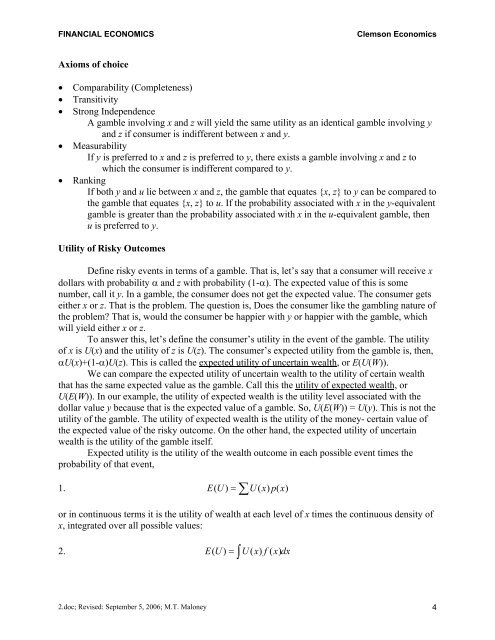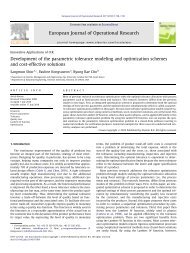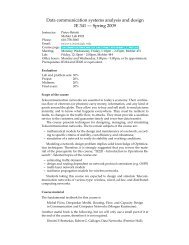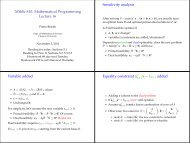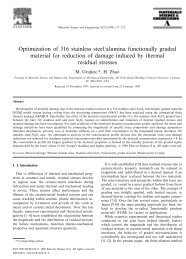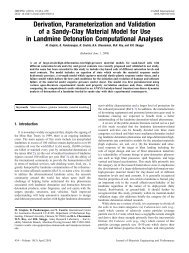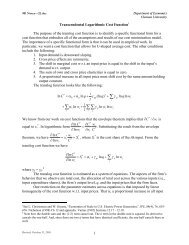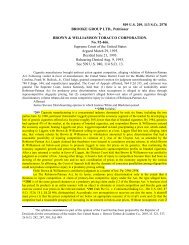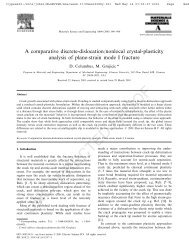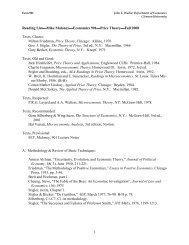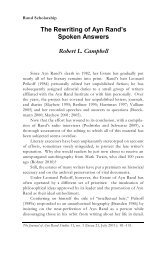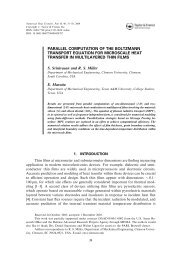Fisher Separation Theorem & Consumer Optimization 1. TWO ...
Fisher Separation Theorem & Consumer Optimization 1. TWO ...
Fisher Separation Theorem & Consumer Optimization 1. TWO ...
You also want an ePaper? Increase the reach of your titles
YUMPU automatically turns print PDFs into web optimized ePapers that Google loves.
FINANCIAL ECONOMICS Clemson Economics<br />
Axioms of choice<br />
• Comparability (Completeness)<br />
• Transitivity<br />
• Strong Independence<br />
A gamble involving x and z will yield the same utility as an identical gamble involving y<br />
and z if consumer is indifferent between x and y.<br />
• Measurability<br />
If y is preferred to x and z is preferred to y, there exists a gamble involving x and z to<br />
which the consumer is indifferent compared to y.<br />
• Ranking<br />
If both y and u lie between x and z, the gamble that equates {x, z} to y can be compared to<br />
the gamble that equates {x, z} to u. If the probability associated with x in the y-equivalent<br />
gamble is greater than the probability associated with x in the u-equivalent gamble, then<br />
u is preferred to y.<br />
Utility of Risky Outcomes<br />
Define risky events in terms of a gamble. That is, let’s say that a consumer will receive x<br />
dollars with probability α and z with probability (1-α). The expected value of this is some<br />
number, call it y. In a gamble, the consumer does not get the expected value. The consumer gets<br />
either x or z. That is the problem. The question is, Does the consumer like the gambling nature of<br />
the problem? That is, would the consumer be happier with y or happier with the gamble, which<br />
will yield either x or z.<br />
To answer this, let’s define the consumer’s utility in the event of the gamble. The utility<br />
of x is U(x) and the utility of z is U(z). The consumer’s expected utility from the gamble is, then,<br />
αU(x)+(1-α)U(z). This is called the expected utility of uncertain wealth, or E(U(W)).<br />
We can compare the expected utility of uncertain wealth to the utility of certain wealth<br />
that has the same expected value as the gamble. Call this the utility of expected wealth, or<br />
U(E(W)). In our example, the utility of expected wealth is the utility level associated with the<br />
dollar value y because that is the expected value of a gamble. So, U(E(W)) = U(y). This is not the<br />
utility of the gamble. The utility of expected wealth is the utility of the money- certain value of<br />
the expected value of the risky outcome. On the other hand, the expected utility of uncertain<br />
wealth is the utility of the gamble itself.<br />
Expected utility is the utility of the wealth outcome in each possible event times the<br />
probability of that event,<br />
<strong>1.</strong> EU ( ) = ∑ U( x) px ( )<br />
or in continuous terms it is the utility of wealth at each level of x times the continuous density of<br />
x, integrated over all possible values:<br />
=z<br />
2. EU ( ) U( x) f( xdx )<br />
2.doc; Revised: September 5, 2006; M.T. Maloney 4


